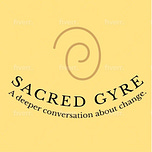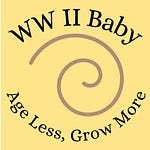A while back I related a story on Facebook that my Dad told me. It was a story about when he visited New York City as a young man. He was unfamiliar with the transit system and ended up in Harlem where most of the people who got on the train had some shade of black or brown colored skin and he said that, in the moment, he felt anxious.
Some of my extended family members posted in response that our grandparents enlisted a midwife who was African American and who was treated as a friend as well as a midwife. She was the professional who assisted our grandmother as she gave birth to every child in the family.
I interpreted their response to mean they were worried my Dad would be seen as racist as a result of my posting his comment. I believe that they and I both spoke of things that were true, and that experience illuminates for me some of my concerns about the term "unconscious bias."
If you listened to Episode 17 of my Butterfly Arose podcast where I talk about Person and Family Centered Care, you know that I, and the team I was on, used that term as we onboarded and trained patients to volunteer for the PFCC program.
I gave our reasons for doing so, some of my concerns with how people might react defensively to it, and some of what we did to reduce the potential for defensive reactions, including why we used a specific video for that purpose. I still felt conflicted about using the term and wished there were an easily recognizable alternative.
My dad did in fact relate that story to me of an experience he had in New York City. We were talking at a time when I was in my fifties, decades after the experience happened. And it was in the same time period when he blurted out that I had been right about the War in Vietnam. He was not agreeing with my youthful radical politics, but about other, deeper things I'd said about how American involvement in Vietnam had occurred.
I think his relating the story about ending up in Harlem was also in reaction to something I'd done in the early 1960's and that showed up in the way I talked about politics with my family. I walked in the March on Washington for Jobs and Freedom in 1963, and that experience informed a lot of the way I talked about workers’ rights, and my anger at exploitation of ordinary workers. I saw the extra exploitation that Black People faced, connected it to times when other people faced discrimination because of their ethnic background and took that as reasoning for why I became more radicalized in the mid-1960's.
I was also explicit in saying I thought that negative beliefs about Black people were embedded in our culture and that, along with generalized fears of violence, caused many Americans to stay away from the 1963 March or even to oppose it happening.
I took his telling me that story, about ending up in Harlem when he got lost on the subway, as an acknowledgement that he understood and agreed in some respects with things I'd said. I think he had some understanding of ways that old beliefs about Black people were part of the cultural background that affected things like red lining and unequal economic and social outcomes. And I think he knew for himself that it is possible to have assumptions about other people that turn out to be inaccurate.
The Dad I knew was kind and thoughtful toward others. I do not think he was a racist. My belief about him and the heritage he came from was based on more than just that my grandparents employed, and befriended, a midwife who happened to have African American heritage. There were other family stories I knew about.
My grandfather was a southern Baptist minister. In 1928, all such ministers were told by their national leadership to tell their parishioners to vote against Al Smith, the first candidate for president who belonged to the Catholic religion. My grandfather refused to do so and was sanctioned for it. My Dad would have been 15 years old when that happened.
Another time, my grandparents discovered that a young woman from China had been enticed to live with a local family with the promise of going to college. When she arrived, they took her identification documents and used her as a housekeeper. My grandparents rescued that young woman, took her into their home and made sure she got her college degree.
I heard other stories like this, and they aligned with what I knew of my Dad. Even as we lived in a place where our family experienced discrimination because he'd divorced his first wife, my birth mother. Even as he took us to the Unitarian Church to avoid being seen as an atheist; something that would have prevented him from serving as a Boy Scout commissioner at the time if it had become known publicly. Even with all this, he still was decent and kind to others no matter their personal beliefs.
In the context, years later, when he told the story about the nervous reaction he felt when he ended up in the middle of Harlem on the subway, it was him acknowledging, I think, that every human being is subject to experiencing emotions in the moment that reflect an unconscious fear or anxiety. Emotions that do not have to become a defining feature of their inner selves. I think it reflected the best of his sense of honesty and was a courageous act. I would not have known about this incident if he hadn't told me.
My other three colleagues on the PFCC team each had their own experiences of other people reacting to them or their families in ways that had nothing to do with their lived realities and was likely in part some unconscious belief or memory. We all believed that helping our volunteers become more aware of when this human tendency might be happening to them was an important part of the success of person and family centered care.
And we shared the concern that, during our trainings, people might react defensively, not wanting to be seen as some sort of bad person with poor moral values. We also knew that the larger healthcare organization that we worked for supported us. It had conversations among new hires, plus ongoing classes that at least in part helped employees in being aware of their unconscious reactions.
I wish there was a universally accepted and understood way of referring to what we call unconscious bias. If you do an online search for the meaning of unconscious bias the results will be filled with examples of beliefs that prejudge another group in a negative way. Even the alternative term "implicit bias" is mostly defined this way as you can see from an article by Robert F Smith. You can follow the link if you read the podcast online.
Yet this ability to create unconscious connections is also vital to our survival. In Episode 17 of Butterfly Arose I talked in some detail about how learning to ride a bicycle is an example of this. Like any other complex physical skill, becoming proficient requires being in touch with a mass of information coming from our bodies; something our conscious minds are not able to do in the moment. We practice, our minds make note of what we do that is successful and it creates something in our unconscious minds that can react to instantaneous information and keep us from falling over as we ride our bikes.
And this also happens on the level of social interaction. When I was growing up, if you met someone and put forward your right hand and said something like. "Hi, my name is Emily, it's a pleasure to meet you," you would be greeted in a similar way by the other person, taking ahold of your hand, shaking it, and giving their name in return. People did this instantly because it was a way of reacting that was embedded in their minds. Every culture, and even subculture, has its ways of doing this, and we don't have to think about it in the moment. We just know how to react. It's a way of letting the other person know you have positive intentions; you are not a threat.
By the time we are in our mid-teens to early twenties, at least, we have an uncounted number of these unconscious connections, ways of reacting that help us be successful.
We are complex human beings and tendencies or abilities that make us successful in using both physical and social skills, can also happen in ways that are harmful. On the personal level, our desire to be a part of the group can be affected by a fear of being seen as incompetent for example. That fear can lead us to hide, to find ways to not be seen. We do things to get along, reacting in ways that reflect beliefs about what others think, and about shared group expectations of what to do when we sense those unspoken beliefs.
Person and Family Centered Care is a change in the culture of medicine in that patients are increasingly seen as having information vital to understanding how the system is working. And information and ideas that are important to making improvements that work for everyone. In this context we need the skill of becoming curious, of seeking to understand the other person's perspective even as we are open and honest about what we know and think. Unconscious reactions to people who are different than us can get in the way of these conversations.
The rub is that if we talk about how to react when we notice unconscious connections arising in our thoughts, we risk having the conversation in a way that leads people to react defensively. If so, they might go along on a superficial level but not change. This is my concern with the term "unconscious bias." I think it has a lot of emotional associations, in our society, that can cause people to fear being seen as racist or morally inferior in some other way.
I could not find the precise posting about my Dad that I put on Facebook which I'm referring to in this episode. I'm guessing that if did find it I would likely see ways in which I could have done a better job of expressing myself. This is a major reason I mostly write on Substack. It gives me more freedom to go into depth.
This is a genuine challenge, and I will go into this in more detail in Episode 18 of Butterfly Arose. I will be talking there about challenges we face as change agents. But I wanted to take a moment to be more transparent about how I personally see this dilemma, because our current belief systems are reflected in our ways of reasoning and in the positions we take. This thinking out loud process is one way I try to hold myself responsible for living up to my deepest values.
Thank you for listening. You can follow links I refer to in my podcasts by going to the written format on Substack.
If you would like to hear or read more of my podcast episodes, please sign up by going to my About page at WW II Baby Substack. Every subscriber receives all my posts, but if you are so moved I would appreciate your becoming a paid subscriber. It helps me with the costs of creating these podcasts.












Share this post